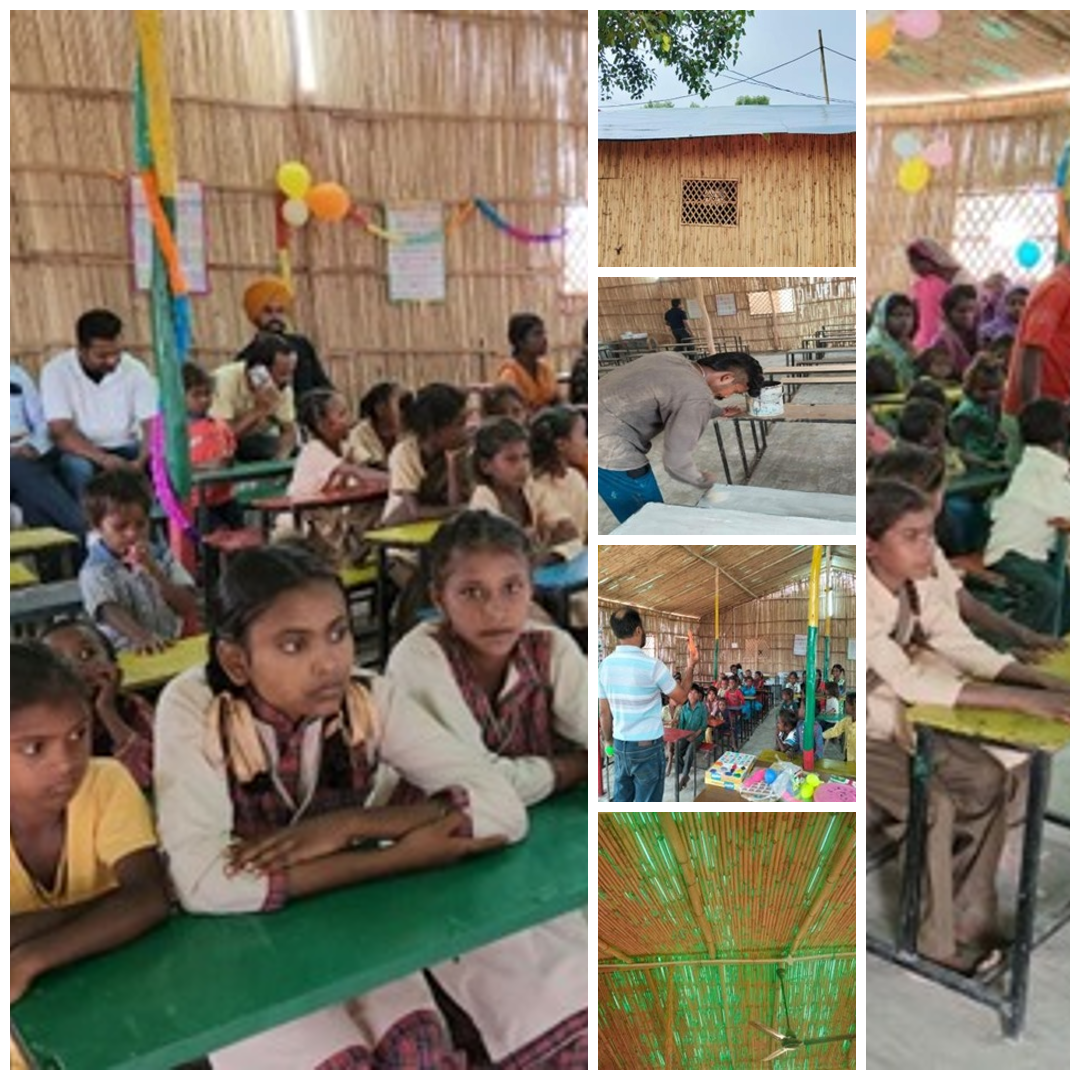Bamboo Schools Initiative in Patiala District

Introduction: Patiala, a district with 119 brick kilns, is home to numerous migrant families from Uttar Pradesh and Bihar seeking seasonal work. These families face significant challenges, particularly in providing their children with stable education. The children of these migrant workers, often residing in brick kilns and segregated slum areas, encounter numerous barriers to education, including the absence of nearby schools, transportation difficulties, and minimal parental support. These children’s daily lives are marked by instability and hazardous working conditions, which impede their access to formal education. Additionally, they frequently experience a sense of alienation in the school settings, which contributes to higher dropout rates as they struggle to adapt to the environment. To address these critical educational needs, the Bamboo Schools Initiative, led by the Hon’ble Deputy Commissioner in collaboration with the Elementary Education Department, aims to provide accessible education within the children's immediate environment. This initiative seeks to create a safe and supportive learning space, helping children transition smoothly into the formal school system and ensuring they do not feel alienated.
Target Group: The initiative focuses on children residing in brick kilns and segregated slum areas, where conventional educational opportunities are severely limited. With migrated and segregated population-the challenges they encounter—such as lack of transportation, unstable educational infrastructure, and inadequate parental support—significantly hinder their ability to receive consistent schooling and achieve academic progress.
Current Efforts: In Patiala, under this initiative, two bamboo schools have been established at Kheri Gaurian and Massingan brick kiln, serving 156 students. The Bamboo School at Massingan brick kiln has already commenced operations, benefiting children residing there. The initial survey for these schools was conducted with the assistance of Block Primary Education Officers, School Teachers, and Inclusive Education Volunteers appointed by the School Education Department specifically for out-of-school children, many of whom have transitioned to regular teaching roles within the schools. The students in brick kilns are enrolled in nearby Punjab Board Government Schools.
Expansion Plan:
Expansion Plans:Our goal is to expand the initiative to all 119 brick kilns in Patiala. By
scaling up the Bamboo Schools Initiative, we aim to provide a similar level of educational
support to children in every brick kiln across the district. This expansion will involve setting
up additional bamboo schools, enhancing partnerships with brick kiln associations, and
ensuring comprehensive support services for students.
Why Bamboo Schools? These cost-effective schools are designed to overcome land constraints and provide a crucial educational environment for children within their place of stay. To further enhance accessibility, bamboo schools are set up directly within the brick kilns, eliminating the need for transportation. This innovative approach allows children to receive education within their immediate environment, providing a safe and supportive learning space right where they live and work. Additionally, these schools help children adapt better to formal schooling environments, reducing dropout rates by addressing their initial feelings of alienation.
Resource Person: The resource persons for teaching these students are the government school teachers where these kids are enrolled in the schools. The Block Primary Education Officer (BPEO) gives the responsibility to the teachers, assessing the teacher-student ratio at the schools so that the regular schools aren't disturbed as well.
Mid-Day Meal Provision: Enrollment in the Government Schools also provides access to mid-day meals, which support the children's nutritional needs and act as an incentive for families to prioritize education. The availability of meals encourages regular attendance, helping to address one of the significant barriers to education.
Facilities at Bamboo Schools:
Bamboo school is equipped with:
Electricity: Ensuring a reliable power supply provided by the brick kiln.
Fans and Lighting: To maintain a comfortable temperature and adequate visibility for learning.
Flooring and Fiber Sheds: To protect students from rain and ensure a clean and safe learning space.
Necessary Educational Resources.
SOP for Completing the Academic Year
Initial Enrollment and Sensitization:
Enroll Children: Ensure children are enrolled in local schools within Patiala by coordinating with these schools for admission and necessary documentation.
Parental Sensitization: Conduct sessions with parents to emphasize the importance of enrolling their children in schools when they return to their home state.
Focus on Younger Children: Surveys indicate that older students tend to stay in their home state, while younger children accompany their parents. The goal is to ensure that after 8th grade, students continue their education in their home state.
Adaptive Learning and Activity-Based Activities:
Personalized Learning Plans: Develop tailored learning plans that include activity based activities to engage students and meet their diverse learning needs, ensuring continuous educational progress.
Seasonal Migration and Continuity:
Support Returning Students: Facilitate the return of children to bamboo schools when families come back to Patiala, maintaining personalized learning strategies to help students adjust and continue their education.
Ongoing Parental Engagement: Continuously engage with parents to reinforce the importance of education and encourage them to seize educational opportunities for their children.
Monitoring:
Attendance Tracking: Monitor attendance records to identify issues and promptly address underlying problems.
This helps maintain high levels of student engagement and participation.
Collaboration and Partnerships:
District Administration: Managed by district development fellow for communication, planning, and monitoring of
the project.
Education Department: Coordination with the DEO and Deputy DEO to ensure alignment with educational standards and effective resource allocation.
Red Cross: Responsible for overseeing Bamboo Schools construction management.
Collaboration with the President Brick Kiln Association and Owners:
Provide essential facilities for the bamboo schools.
Ensure availability of resources such as a reliable power supply from the brick kiln and utilities.
Foster parental involvement in the educational process.
Engage brick kiln owners, leveraging their significant influence over the parents.
Conclusion:
The Bamboo Schools Initiative effectively addresses key educational barriers for children
in brick kilns and slum areas by providing accessible, on-site learning environments,
personalized learning plans, and essential resources. This comprehensive approach
ensures continuous education, reduces dropout rates, and supports both academic and
nutritional needs, ultimately fostering a brighter future for these vulnerable children.



Comments 0 Like 0 Dislike 0